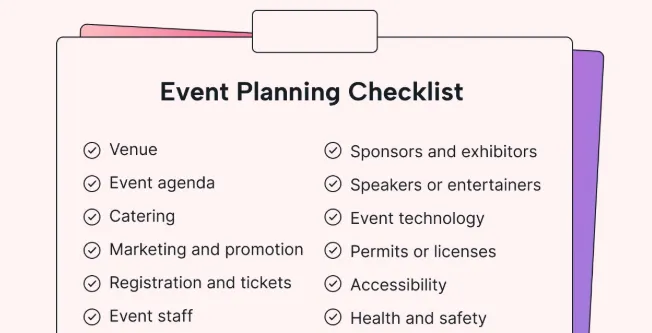Organising an event, whether it’s a corporate conference, community fundraiser or private celebration, can feel daunting. From the initial concept to the final applause, countless moving parts need to come together seamlessly.
Effective preparation and foresight are key to ensuring success, and that is why mastering the fundamentals of planning an event is so essential.
Below is a comprehensive guide to help you navigate the process with confidence.
Define Your Purpose and Goals
Before you book a venue or send out invitations, clarify the purpose of your event. Ask yourself:
- What do I want to achieve?
- Who is my target audience?
- What outcomes would define success?
For example, a business might host a seminar to showcase expertise, while a charity may focus on raising awareness or funds. Having clear goals allows you to make decisions that align with your objectives, from the format of the event to the type of speakers or entertainment you book.
Establish a Realistic Budget
One of the most critical aspects of event management is setting – and sticking to – a budget. It is tempting to splash out on extras, but costs can spiral quickly. Break your budget into categories such as venue hire, catering, marketing, equipment, staffing and contingency funds.
Always allow for unexpected expenses, as last-minute changes are almost inevitable. By keeping a detailed record of all projected and actual costs, you’ll avoid nasty surprises and keep your event financially viable.
Choose the Right Venue
The venue sets the tone for the entire event. Consider accessibility, capacity, facilities and atmosphere when making your choice. For instance, a high-profile gala might demand a grand hall, while a workshop could work perfectly in a modest but well-equipped community centre.
Also, think about practicalities such as parking, public transport links and accommodation nearby for out-of-town guests. A venue that is convenient and welcoming will enhance the experience for attendees.
Build a Timeline
Good organisation relies on strong time management. Create a timeline of tasks from the earliest stages of planning through to post-event evaluation. Include key deadlines for booking suppliers, confirming speakers, opening ticket sales and final rehearsals.
Working backwards from the event date can help you allocate realistic timeframes to each stage. Tools like digital calendars or project management software can be invaluable in ensuring nothing slips through the cracks.
Secure Reliable Suppliers
Suppliers can make or break an event. From caterers and florists to audio-visual technicians, choose vendors with a solid track record. Ask for references, check reviews and don’t be afraid to negotiate on price.
Clear contracts are essential to avoid misunderstandings. Confirm delivery times, set-up requirements and cancellation policies in writing. Building strong relationships with suppliers will give you peace of mind on the day itself.
Focus on Communication and Marketing
No matter how well you organise, your event won’t succeed if nobody knows about it. Develop a marketing strategy tailored to your audience. This might include social media campaigns, press releases, email newsletters or traditional advertising.
Equally important is communication with stakeholders such as sponsors, speakers and attendees. Provide regular updates, confirm expectations and be available to answer queries. Clear communication ensures that everyone involved feels informed and valued.
Prioritise the Guest Experience
Ultimately, the success of your event will be judged by the experience of your guests. Pay attention to details that make attendees feel comfortable and engaged. Consider accessibility needs, dietary requirements, seating arrangements and entertainment.
Think about how guests will interact with your event from start to finish – from registration and signage to networking opportunities and feedback surveys. The smoother the journey, the more memorable the event.
Prepare for Contingencies
Even with the best planning, things can go wrong. Equipment may fail, a speaker might cancel, or the weather could turn against you. Create contingency plans for potential problems.
For example, have a spare microphone available, identify a back-up speaker, or arrange for a marquee in case of rain at an outdoor event. By anticipating challenges, you’ll be able to respond quickly and calmly.
Evaluate and Learn
Once the event is over, don’t forget the final step: evaluation. Gather feedback from attendees, staff and stakeholders. What worked well? What could be improved? Review your budget to see if you stayed on track and assess whether you achieved your original goals.
This process not only helps you refine your skills but also provides valuable insights for future projects. Every event, no matter how small, is an opportunity to learn and grow.
Final Thoughts
Planning an event is both a science and an art. It requires careful organisation, creativity and resilience. By setting clear goals, managing your budget, choosing the right venue, and prioritising guest experience, you can create an occasion that achieves its purpose and leaves a lasting impression.
Whether you are organising a small community gathering or a large-scale corporate function, remember that preparation is everything. With the right approach, your event will not just meet expectations – it will exceed them.
